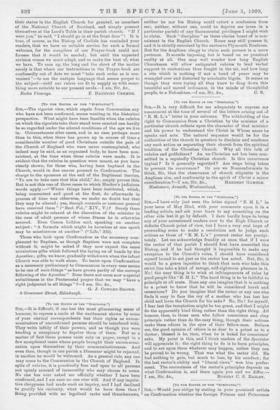[To TOR Eorron Or TUB . 8PROTATOR:] Si,—The rigorist view, which
repels from Communion any who have not been confirmed, seems wanting in the historical perspective. What might have been feasible when the rubrics on which the rigorists take their stand were enacted can hardly be so regarded under the altered conditions of the age we live in. Circumstances alter cases, and in no case perhaps more than in this,when there has grown up in course of time a considerable number of good Christians outside the pale of the Church of England who were never contemplated, who indeed may be said, as an organised body, to have been non- existent, at the time when these rubrics were made. It is evident that the rubrics in question were meant, as you have clearly shown, for those who, having been baptised in the Church, would in due course proceed to Confirmation. The charge to the sponsors at the end of the Baptismal Service, "Ye are to take care that this child," &c., amply proves this. But is not this one of those cases to which Hooker's judicious words apply :—" Where things have been instituted, which, being convenient and good at the first, do afterwards in process of time wax otherwise, we make no doubt but that they may be altered; yea, though councils or customs general have received them" ("Ecol. Pol.," XIV., V.) P • Surely these rubrics might be relaxed at the discretion of the minister in the case of adult persons of whose fitness he is otherwise assured. Even Canon Liddon said, speaking on another subject : "A formula which might be harmless at one epoch may be mischievous at another" (" Life," 322).
Those who look upon Confirmation as the necessary com- plement to Baptism, as though Baptism were not complete without it, might be asked if they now expect the same miraculous gifts which followed the laying on of hands by the Apostles ; gifts, we know, gradually withdrawn when the infant Church was able to walk alone. To insist upon Confirmation as a necessary preliminary to Communion in every case seems to be one of such things "as have grown partly of the corrupt following of the Apostles." Does there not seem now a special suitableness in the Pentecostal prayer that we may "have a right judgment in all things" P—I am, Sir, &o.,










































 Previous page
Previous page